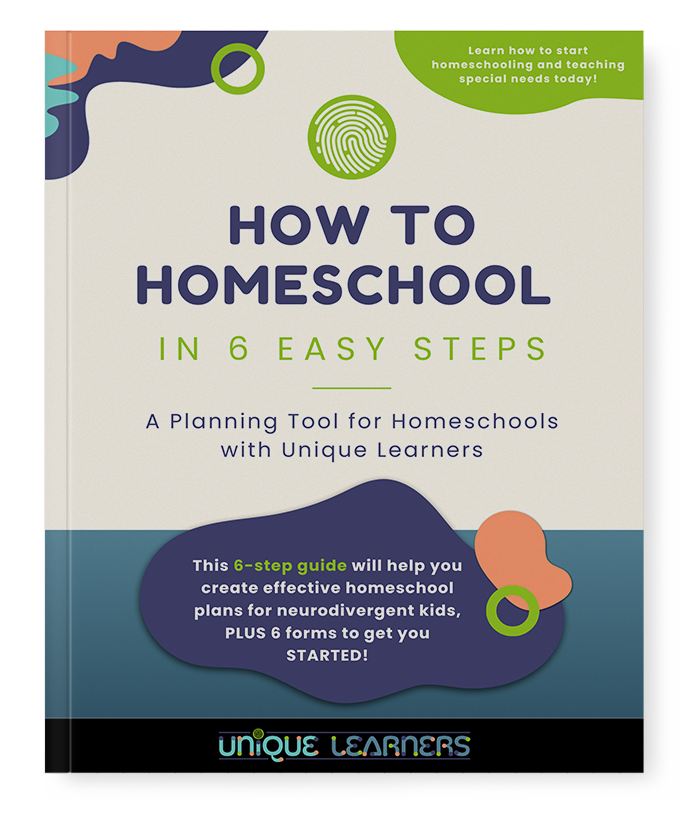
Some homeschool moms spend months or even years planning to homeschool their children. They research homeschool approaches and the laws of their state. They study educational philosophy and organization. They read the descriptions of every curriculum available on the market. They plan and plan.
Other homeschool moms know something isn’t right for their children in the school setting. Sometimes they discover their child has been bullied because anxiety has ramped up. Sometimes they discover their child has learning issues from not turning in assignments or poor grades. Their decision to homeschool is more spur of the moment to protect their kids.
No matter what motivates a mom (or dad) to homeschool, the struggle to figure it all out can be overwhelming in that first year or two. Then the routine settles. The lessons begin. The disparity between expectations of a streamlined, perfect learning environment contrasted with resistant kids in a messy house becomes overwhelming at times.
Even after several years, seasoned homeschool parents may wonder if it was all worth it. I want to share with you the subtle, unwritten lessons that homeschool moms teach and don’t even realize what they are passing along to their children just in the process of home educating.
1. Risk Taking.
Governments around the world, and especially in the United States, have made it clear that the system thinks teachers are the experts, parents have a specific role, and that kids are better off in an institutionalized education setting. The pandemic made it clear to many parents what actually happens in a standards-based, curriculum-driven educational program. Just by thinking about homeschooling, you are demonstrating for your children that you are a risk-taker. Homeschool moms are not afraid to go against the majority for the sake of your own family.
2. Determination.

It takes more than a couple of hours to research how to homeschool. You are determined to follow your state laws. You are determined to set up your space and time. You are determined to do what is best for your children within the limits of your family’s restraints. You, homeschool moms, are brave pioneers.
3. Flexibility.
Almost always, and especially if you are choosing to homeschool quickly, you must be flexible. You need to start with some kind of direction. Yet, your approach may morph as you learn whether you like the curriculum or if it doesn’t work for your child. You need to change how to parent because you wear many hats now. You have become a contortionist in thinking, skills, and sometimes body!
4. Innovation and Creativity.
If you have chosen to homeschool and are not a natural teacher, you really are innovative! Those of us who are natural or college trained teachers also need to be innovative because homeschooling is not the same as classroom teaching. Then what happens when your child doesn’t understand a lesson as it is presented in your curriculum. You get creative. You may teach fractions while cooking. You may find a handwriting program that combines history to double up on subjects. You may search Pinterest for art project because you just don’t like crafts. You may take a field trip to a garden shop because you really don’t have a green thumb, but you want your children to understand plants. kids not only learn the fun lesson you have found for them, they see your creative attempts to make learning the most effective for them. Yep, you are one innovative and creative momma!
5. A Work Ethic.

This is perhaps one of the most important lessons you model for your kids. Being a mom is hard work. Parenting a sick child or a resistant teen is really hard work. Add to that teacher of academics, and you are one of the hardest working people on earth! Your children learn that hard work is worth the effort – even if you don’t say a word about getting a job completed and done right.
6. Independence.

You are an independent school. That is the nature of a home school. In some states, you actually register your homeschool as an independent, private school. Unless you are in a high regulation state, that means that you can operate your homeschool the way you think is best for your family. You are not following the crowd. You are not being dictated how to do school. You can independently make choices. Your children learn independence in living just from the process of being in a homeschool environment.
7. Problem Solving Skills.
Problems crop up all the time in a homeschool. Perhaps the most obvious is how to coordinate everyone when the family is at home all the time. When something doesn’t work, you need to figure out how to solve the problem. What if your child doesn’t understand long division. You problem solve by researching. What if the laundry is piling up. You problem solve by creating a different schedule or delegating tasks to different family members. I actually teach my kids a problem solving process for behavior or issues they are struggling with. This 5 step process is the same one used in the corporate world. As problem solvers, our kids have an employable skill that is highly sought after in business.
8. Organizational Skills.
You organize your materials for yourself. You come up with an organizational system for each child to keep their own workbooks or school supplies. You decide what things are shared, and what items belong to each individual. You organize the way time in used each day. You organize your kitchen and teach your kids how to organize their dressers or clothes storage or toys. You may think of this as just doing life – and it is; however, you are also teaching valuable skills that your kids will need as adults.
9. Time Management
Setting a routine or schedule is the organizational side of structuring how you will use time in your homeschool. Implementing that plan is actually time management. You have a plan. You try it out. You tweak it. You want to use time to the benefit of all your children. If your special needs child naturally demands a lot of time, you also arrange to divide that time so that your neurotypical kids get their fair share of instructional time. Many homeschools have a much shorter day than in an institutional school. That is because with fewer students and a more fluid routine, more time can be allotted to outdoor play or field trips or independent activities. Your kids learn that free time is important, so getting schoolwork and chores done leaves them with what is more valuable to them. Scheduling around appointments or your job may arrange your school hours in a way that is not ideal, but necessary. You are still managing time as efficiently as possible. I used to own a brick-and-mortar teacher store. At first, we tried to do schoolwork at the store. Eventually, we set my time and my employees schedules so that I was at the store in the morning, and we did school in the afternoon. My kids were able to play in a playroom at the store and were eager to do their lessons after lunch so they could have more play time. Managing time does not need to look like traditional school hours, but it does need intentional planning. When I started my PhD program, we spent a whole week watching videos and reading research papers about time management. I found it interesting that after 20+ years of homeschooling and having a home-based business, I probably could have taught the strategies that others were learning to balance life back in college, work, and home life as an adult. I had been doing all of that for many years as a homeschool mom, alongside other homeschool moms!
10. Respect for Others.
In order for a homeschool to work, you set the tone of respect for your authority and how you want your children to respect their siblings’ time and materials. That expectation of respect within the family and the homeschool environment inspires a mindset of respect for others throughout life.
11. Money Management.

Most homeschool parents teach their kids how to count money. What many homeschool moms don’t realize is their children watch the struggle to provide quality learning materials on a budget. It doesn’t matter how much income the family has to work with, money is never an unlimited resource. For our homeschool, sometimes we did our own research on the internet rather than order a textbook. Or we made our own games instead of doing more worksheets just so we had active learning activities without ordering a lot of expensive curriculum. Our children watch how we deal with money, so if you aren’t a great money manager, like me, then we learn together. My kids are now adults. They saw my mistakes, we learned together, and now they are able to manage their own income and expenses.
12. Playfulness.
I firmly believe that kids need a lot of free play time without adult involvement. I also think that kids learn that adults still need fun time with friends. My husband and I have continued to be part of a small group through our church, so we have friends to do social things with. used to go camping a lot. We play board games, do crafts, and try to do fun things with our kids. Part of motivating kids to become independent adults is balancing their sense of autonomy, while providing structure that builds success upon success, AND a warm, playful relationship. Playing is such an important part of what we teach our kids!
13. Life Balance.
There is an old adage: “All work and no play makes Jack a dull boy; all play and no work makes Jack a mere toy.” Life balance gives a sense of productivity and that we are needed; while also valuing relationships and down time. As homeschool moms, we often feel like our work is never done and the balance is gone. We have to intentionally make life balance happen. Our children watch us create that balance. If you build into your routine academic study, chores, and play time, you are a wise homeschool mom! Your children will learn to balance work and play because you have modeled that for them.
14. Safety.
There are many reasons over the years that families have decided to homeschool. Most recently, the lack of safety in schools has been a motivator among new homeschoolers. Regardless of your primary reason for homeschooling, mothers have an instinctive need to guard our children from danger. Because you protect the safety of your children, they can relax and enjoy childhood. Their mental health and other needs can be met because they know you keep them safe. If you are not aware of Maslow’s Hierarchy of Needs, click here for a FREE poster from our shop that outlines what we all need to be happy, healthy people. You are likely providing for the needs of your children without teaching Maslow’s Hierarchy directly, and they can thrive because of your protection.
15. Unconditional Love.

I saved this homeschool moms lesson for the last because it is the most important. As a homeschool mom, you can nourish your child’s confidence by the way you respond to mistakes, temper tantrums, or even defiance. Kids are going to mess up. Unconditional love lets a child know that they have freedom to learn and grow without condemnation. As a mother, I want my kids to know that they are valued and loved just because they exist. No matter what they do, I may not always approve of their behavior, but I will ALWAYS love them and be there for them. I often hear new homeschool moms ask what to do about a child who has perfectionistic tendencies. You know, children who are afraid to try because they may make a mistake. Or kids who erase and erase and erase until there is a hole in the paper because a letter was not written perfectly. A child learns to respond to mistakes by the way you phrase your feedback. If you have an anxious child, you are the most important person to teach the lesson that they are worthy, it’s ok to make mistakes, and that no matter what, you are there to support them when they fail. In this lesson, words matter. While all of the lessons are ones you may not realize you are teaching, I hope this lesson becomes an intentional lesson that is reinforced with words.
Regardless of where your kids go to school, you are a teacher of these important lessons. If you homeschool, you certainly have a lot on your plate. Know that you are not alone, and you are a treasure to your family.
If you ARE feeling alone, or want to join a community of other homeschool moms on a similar journey, join our Facebook group, “Homeschool Help for Special Needs.” It is a place for homeschool moms to ask questions about homeschooling a child with special learning needs, share teaching and curriculum ideas that have worked (and those that bombed), and be real about the unique challenges of homeschooling with special needs. If you want to join us, be sure to answer the member questions to help us keep this private group secure. Click HERE to join now!

